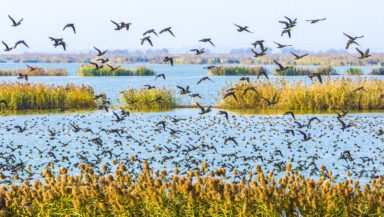A group of young people from Greater Manchester have been inspired to think more about activism and to challenge the UK’s damaging industrial food system through taking part in a project initiated by Manchester-based artist Fauziya Johnson [1].
Fauziya’s aim was to facilitate discussions with young people to learn about the social, economic and environmental impacts of industrially produced food and reimagine a better system that worked for people, the planet and the natural world. She developed the project in response to the industrial meat producer Danish Crown opening a new bacon factory in Rochdale [2].
Following an open call for participants twelve 16-25-year-olds signed up to take part in a series of four half-day workshops that included activities such as sustainable cooking, a visit to the Danish Crown factory and a visit to the Liverpool-based factory of industrial animal feed supplier Cargill [3]. They walked along neighbouring Crosby Beach – which overlooks Cargill’s operations and the gateway for deforestation entering the UK in the form of soya imports from South America, as well as a gateway for the historic international slave trade.
Throughout the workshops, the young people were given space to explore topics such as the violent history of the food system and links to deforestation and the transatlantic slave trade. They also talked about the likely impacts of Danish Crown’s new factory on the local community in Rochdale and discussed more broadly how they felt about sharing their views as artists and activists to create positive change.
Over the course of the creative sessions, the group decided they’d like to continue to meet and talk about issues that matter to them within the environmental movement. They have called themselves Nourish and Flourish. Fatima Bangoura, aged 17, based in Manchester, Fajar Kayani, aged 22, based in Manchester, and Amina Hassan, aged 24, based in Bolton are three of its members.
On Danish Crown, Fajar said: “I think big companies like Danish Crown pick less affluent areas to build their factories because it benefits them. It’s very, very, very rare that they actually give back to the community that they’re using for their own profit.
“There’s no way that mass production of items or food can ever be ethical because it impacts the environment in such a big way.”
On getting involved in activism, Fatima said: “I think a lot of the time I have activist thoughts, wanting to make a difference, wanting the world to be better, but a lot of the time when you don’t voice it, you feel very alone. But coming to a space like this, it’s been so nice to feel the solidarity.”
And on why activism is important to her, Amina said: “Being an activist means to me actively engaging in advocacy or actions to make a positive change. It means using my voice and energy to raise awareness, to also challenge norms, and to create a better future.”
Artist Fauziya, who lives in Old Trafford, said:
“The industrial food system creates disadvantages for everyone, especially the working class and people of colour. It was powerful to create a space where we could collectively map out its global and hyper-local impacts through all kinds of different learning experiences from cooking to site visits to writing and photography.
”A key thread to my artistic practice is combining art and activism to help foster community and belonging, which fulfils people’s desires and needs to make positive change. So it’s been amazing to see the beginnings of Nourish and Flourish emerge. I believe they will all go on to make real change, which is a really exciting prospect.”
Fauziya’s project was selected for funding and support by Greenpeace UK as part of the NGO’s Bad Taste project.
Daniela Montalto, Greenpeace UK forests and food campaigner, said:
“Fauziya’s creative workshops have provided a powerful entry point into the complex and often very personal subject of food sovereignty, and the opportunity for young people to learn and exchange ideas.
“Stopping climate and nature breakdown demands transformative changes to our food system and Greenpeace is campaigning for a 70% reduction in industrial meat and dairy in the UK by 2030 and for the government to support farmers to transition to climate-, people- and nature-friendly farming.
“Climate scientists consistently warn that without significantly reducing industrial meat and dairy production, emissions from the global food system alone would make it impossible to prevent catastrophic climate change.”
ENDS
Download images here: https://media.greenpeace.org/
Contact: Greenpeace UK news team at press.uk@greenpeace.org or 020 7865 8255
Notes to editors:
[1] Fauziya Johnson is a Somali-Dominican queer curator, artist and producer. She creates with a focus on current social and political issues through community-centred workshops, art projects, and exhibitions. Her work creates thought-provoking, engaging and trusted spaces for the public to engage in, making collective care, deconstructing harmful systems, and activism the core of the work for marginalised groups, in particular Queer, Black and disabled communities. She co-founded ROOT-ed Zine in 2017, a zine for Global Ethnic Majority creatives based or from the North-West of England. Fauziya is a Fine Art graduate and a trustee of Metal Culture.
[2] Danish Crown is the biggest pork producer in Europe. It has recently opened its first new processing facility since the sale of Tulip to JBS’ Pilgrim Pride in 2019, in Rochdale, Greater Manchester, which will solely process pork imported from Denmark, to offer a lower price point than British producers. (Reuters, 2022) In 2021, Danish Crown was forced to drop its ‘climate-controlled pig’ label [following a greenwashing row in Denmark after Greenpeace Denmark accused the company of greenwashing and misleading marketing]. In June 2021, three Denmark-based non-profit organisations filed Denmark’s first climate lawsuit against Danish Crown, accusing the company of spreading false claims about the climate impact of meat. A new investigation revealed in November 2023, that a report about the climate footprint of pork was changed at Danish Crown’s request, before it was published by Aarhus University in October 2019. The lawsuit continues.
[3] Cargill Tower, Seaforth, Liverpool Docks
The UK imports around 3 million tonnes of soya each year to feed chickens, pigs and dairy cows. Two thirds of UK soya imports come from countries in South America, where its expansion drives deforestation and human rights abuses. Liverpool docks is the main gateway for soya entering the UK via Cargill, a major industrial supplier of animal feed. The largest US privately held company and biggest importer of soya into the UK, Cargill reached its highest revenue ever in its 158-year history in 2022 at about $177 billion. A recent investigation linked chicken and pork products sold in Tesco stores and fed on Cargill’s soy to the recent, illegal fires and deforestation of 400 hectares of Brazilian Amazon rainforest, equivalent to 560 Wembley football pitches, and the loss of more than 220,000 trees (Mighty Earth, 2023).
A ‘soy moratorium’ was agreed by Cargill and soya traders in 2006 to avoid sourcing from destroyed areas in the Brazilian Amazon. The rapid expansion of the soya industry however, continued at the expense of deforestation elsewhere in some of the most biodiverse ecosystems on earth and linked to human rights abuses.



